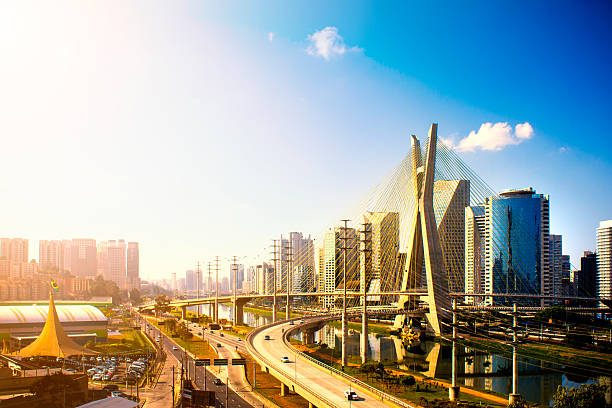Moving to Sao Paulo – the largest city in Brazil
Sao Paulo is not only the largest city in Brazil but also one of the largest in the world and it’s still growing. The expat population keeps expanding, too. Relocating to Brazil is a decision millions of people have made over the past couple of decades. They have found their place in this country and learned to live with its good and bad sides. Even though moving to Sao Paulo (or Sampa, as locals call it) could be the best decision of your life, it comes with a lot of challenges. Here’s a quick overview of what awaits those who decide to move here.

This colorful city with a lot of character will capture your heart forever.
Sao Paulo is full of career potential
Brazil is the world’s emerging economic powerhouse. Not only is Sao Paulo the largest city in Brazil but also the wealthiest. It is the financial center of the country with a booming economy. No wonder this thriving metropolis has been rapidly expanding, drawing people from all over the world. Being the industrial and commercial center of Brazil makes Sao Paulo a great place to succeed in the business world. If you are looking for a job in Sao Paulo you’ll be happy to know that there are many job opportunities for expats in different industries.
Living in Sao Paulo is not cheap
A common misconception about Latin America is that the cost of living is low. That might have been true in the past, but times have changed. The cost of living in Brazil is pretty high. Before deciding to move to Sao Paulo, make sure you can afford it with your income. Like everything else, housing in Sao Paulo is quite expensive, and finding a home in a good neighborhood is not that simple. The prices in major Brazilian cities are as high as those in major world capitals while the choice and quality of products are far behind. The increase in prices is partially caused by high taxes.
Good healthcare and education are available but…
Sao Paulo has recently become a medical tourism destination. Unfortunately, only private medical insurance guarantees good medical care.
Expat children can attend free public schools. However, their parents usually opt for one of many international schools after moving to Sao Paulo. International schools are good but very expensive.
Chose your neighborhood wisely when moving to Sao Paulo
Before you call long distance movers Brazil and set sail, you need to find a place to live. In order to avoid spending an eternity in traffic, try to find a home as close to work as possible. We know this is easier said than done, but it would make your life so much easier. When it comes to neighborhoods, the choice is wide – from high-end to barely livable. These are some of the most popular:
- The garden districts – highly desirable, upscale neighborhoods with low rise housing. They are located southwest of the center, close to a fancy shopping street and an important business district.
- The downtown district – full of older buildings and bigger renovated apartments, regaining popularity.
- Pinheiros – a bohemian neighborhood.
- Higienopolis – famous for Modernist architecture.
- Vila Madalena – a gorgeous, traditionally bohemian neighborhood, famous for its cafes and bubs.
- Moema and Itaim Bibi – middle-class neighborhoods located in the southern part of Sao Paulo, full of high-rise apartments.
Moving your belongings to Sao Paulo
Hiring one of the international movers Brazil has to offer can make the move a lot easier. In the hands of professionals, your possessions will be transported safely to your new home. Additionally, if you have your belongings packed by a company that offers packing services in Brazil, you can save your energy for other aspects of your relocation to Sao Paulo.

As long as international movers Brazil are taking care of your belongings, you have one less thing to worry about.
Put your free time to good use
Sao Paulo does not allow you to get bored. There are many cultural and recreational activities to chose from, some of which are free.
- There are several popular festivals, such as the famous Carnival.
- Fashion is a big deal in this stylish city. South America’s most prestigious Fashion Week takes place twice a year in Sao Paulo.
- Brazilians are crazy about football, and who wouldn’t be with such great teams. Sao Paulo has produced three successful teams – the Corinthians, Sao Paulo, and Palmeiras.
- Art lovers can enjoy numerous museums, the most famous being Sao Paulo Art Museum.
- Restaurants, nightclubs, and bars are abundant.
- Forget about moving to Sao Paulo if you don’t like music, street artists, and performers because they’re everywhere.
The beautiful outdoors
If you like spending time in nature, Sao Paulo offers many public parks, such as the iconic Ibirapuera Park. Visit Pico do Jaragua – the highest mountain in Sao Paulo – where you can see monkeys and enjoy the spectacular view of the city. Unfortunately, there is too little green space to satisfy the needs of a growing population, which is why many people spend their days off in the mountains, rainforests or on the beach. The Paulista Coast is full of gorgeous coastal towns, perfect for a weekend getaway. Among the most popular beaches are Guaruja, Juquehy, Maresias, and Camburi. During the winter season, you can go hiking or cycling in the stunning Mantiqueira Mountains.
Sao Paulo is a melting pot of cultures
Immigrants coming from all continents make it one of the world’s most ethnically diverse cities. Over the past century, it has welcomed large numbers of people from Portugal, Japan, Korea, Germany, Italy, the Middle East, etc. Almost 6 million people of Italian origin make the city’s biggest ethnic group. Not only are there lots of people from other countries but also from other parts of Brazil. Hence, you can meet Brazilians that are new to the city, just like you.
Making friends in Sao Paulo

Moving to Sao Paulo means meeting a lot of new people.
What is life without friends? Apart from having someone to spend free time with, connecting with the residents of Sao Paulo can spare you a lot of unnecessary trouble.
Connecting with the locals
Living abroad, far away from our friends and relatives, is not easy. Although thanks to modern technology we can keep in touch with anyone almost instantly, it’s just not the same as meeting in person. Moving to Sao Paulo is a great opportunity to make new friends. Brazilians are Brasil’s best feature. They will give you advice only locals can give you and help you adjust to the new environment. Try meeting some locals online before moving to Sao Paulo. This way you can be included in their circle as soon as you arrive. Did you know that Brazilians are the best hosts? They like to pamper their guests, feed them delicious food and always ask them to stay longer.
Connecting with other expats after moving to Sao Paulo
Living in Brazil poses unique challenges for expats. Having expat friends is recommended when starting a new life in Sao Paulo. Fortunately, this city has a large expat community. They are already familiar with the things you have yet to experience. Since they know exactly what you are going through, their advice and support can be priceless. Meeting expats living in Sao Paulo online before your arrival is also a good idea.
Start learning Portuguese before moving to Sao Paulo
Not being able to communicate normally is a major source of stress when moving to a foreign country. English is not commonly spoken in Brazil, in fact, very few people speak English.

Brazil is so big that more people in South America speak Portuguese than Spanish.
Therefore, the sooner you start speaking Brazilian Portuguese, the better. If you think you can manage with Spanish, you’re wrong. Although Spanish helps, it’s not enough. Knowing the basics of Portuguese isn’t enough either. So, get to work. Bear in mind that informal Portuguese is full of slang expressions and shortened forms that are not taught in school. If you make a mistake, don’t worry – the locals will correct you, without judgment.
The disadvantages of moving to Sao Paulo
Some of the city’s most serious problems are pollution, crime, traffic, litter, bureaucracy and time management. How quickly you adapt and accept its flaws depends on where you’re coming from. For instance, if you are moving to Sao Paulo from another metropolitan city, you’re probably used to traffic congestion and high levels of pollution.
Pollution doesn’t spare anyone who relocates to Sao Paulo
The residents of this city often complain about not being able to see the stars at night due to air pollution caused by so many vehicles and factories. During daytime, the sky is constantly painted gray with smog. Equally annoying is noise pollution. In addition to noisy traffic and loud music, people here even speak loudly. One simply cannot escape the noises this huge city produces.
The fight against crime is far from over
In Sao Paulo, the citizen’s safety is one of the biggest issues. In such a crowded city, everyone’s an easy target for muggers, any time of the day. Pickpockets and bag snatchers pose a serious threat, not only for the tourists but also for the locals. Make sure to always be aware of your surroundings and keep an eye on your wallet, phone, laptop and other valuables, especially in places like tourist attractions or metro stations. Moreover, violent crime rates are quite high. Some parts of the city are more dangerous than others. The infamous slum areas, better known as favelas, are among the most dangerous in the world. In fact, more than a half of the city is considered unsafe. Therefore, do your research on the city’s neighborhoods and their safety before moving to Sao Paulo.
Daily commute – the daily struggle
Despite the authorities’ efforts to solve this issue, the traffic is still one of the biggest complaints the inhabitants of Sao Paulo have. Not surprisingly, with over 12 million Paulistanos (residents of Sao Paulo), the city has more traffic than it can handle. Traffic congestion is at its worst on Fridays. Hordes of people escaping the hectic city life on weekends cause some of the worst traffic jams in the southern hemisphere. You’ll need a lot of patience when caught in the middle of a 180km-long traffic jam. Nevertheless, owning a car would be useful for those who live on the outskirts or frequently go out of town.

Millions of cars on the streets of Sao Paulo cause horrific traffic jams.
On the bright side, at least the public transportation system is solid. Within the city, you can use the bus services or the metro. Brazil’s road network – the largest in Latin America – keeps the country connected. Still, the best choice for traveling between Brazilian cities is the plane. The region has three main airports.
Hygiene could be better
Expats moving to Sao Paulo might be unpleasantly surprised by the amount of garbage on the streets. Although the situation has improved, litter can still be seen lying around, especially in smaller streets. Despite having sufficient garbage cans, people seem unwilling to change the bad habit of throwing trash on the street. Even though Paulistanos clean in front of their homes and stores, they are likely to throw trash on the street or push it to their neighbor’s side!
Bureaucracy will test your nerves

Get used to a lot of queuing and poor customer service after moving to Sao Paulo.
In Brazil, you cannot escape the frustrating bureaucracy. For example, you’ll need an ID for small everyday purchases like buying a local SIM card or a bus ticket. Not to mention more complex procedures like getting a visa or accessing the healthcare system. Procedures that are supposed to be simple are overly complicated, confusing and slow.
Late is the new punctual in Sao Paulo
In Brazil, you will discover a whole new meaning of tardiness. Everything takes more time than you expect. Brazilians’ attitude towards time is, let’s say, very relaxed. Being 10-20 minutes late is the same as arriving on time. Although they tend to blame the traffic for being late, the truth is that traffic just adds to the problem. You’ll have no choice but to accept their way of managing time.









